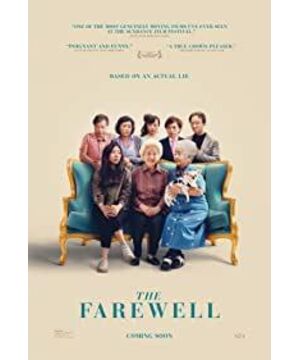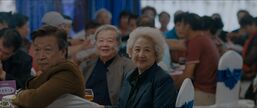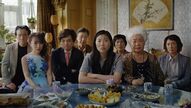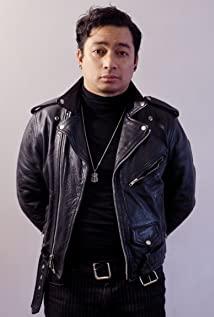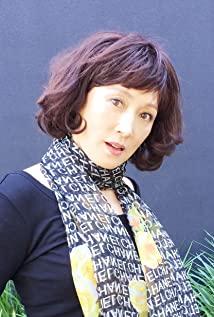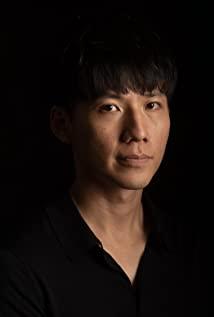Why am I giving so many five stars recently? I feel that the recent dramas I watched, whether anime or movies, are complete in terms of stories. It's really not easy... I finally don't always watch those stories about one hammer and one stick... I'm so moved I cried... Really, after watching a bad movie for a long time, I finally watched a somewhat normal film, and I was moved to cry... The bad film is really fucking poisoning my eyes. fuck. Alright, back to the point. This film was told by the seniors to watch, mainly to learn the character lines in the film. But after I watched it, I felt that the lines were not the most outstanding. The film's realism, the discussion on the different attitudes of Eastern and Western cultures towards death, and the culture of seeking roots of overseas Chinese and overseas Chinese were the most outstanding. Actually it's hard to say. Let's talk about the realism of the film first. This film is about to catch up with the documentary. This daily life is too TM real. If a domestic film is shot in an urban drama, the scenes can be presented so realistically, it is estimated that the dream of a group of people will be shattered. Hey, forget it, don't criticize urban dramas, just know that the fake outrageous is for falling in love, anyway, sometimes when you are tired, you really need a little spiritual opium to dream. In fact, this super realistic scene presentation is also a talent. After all, not everyone can really translate what they see, think, and feel in their daily lives to movies. Because some people have never really experienced the perspective of an outsider in this situation, and cannot perceive the macroscopic picture. It is because they are so accustomed to it that they cannot perceive it. Only those who are very delicate can do it. At the same time, there will also be a kind of unaccustomed and pretentious detachment if you really go to shoot, and you can't shoot it.
As for the attitudes of Eastern and Western cultures towards death, if we really want to break it up, there are so many things that you can make a movie here, so I won't go into details. I just think that Eastern culture pays more attention to social attributes in terms of human attributes and meanings, while the West pays more attention to personal attributes. Therefore, we often see national heroes, while the West often sees individual heroism. In fact, I think it's all a culture, it doesn't matter whether it is good or bad. But when I look at the bullet screen, many people say that this can't be done without hiding it, how can it be bad, can't explain the future, and can't do what you want to do...emmm...I actually think these are a bit too simplistic and rude, The choice under culture shock is more complicated. (Of course I feel the same way, after all, I grew up under the individualism of the younger generation, but the choice here is actually a dilemma, especially for the older generation.)
Westerners think that when a person dies, physical death means that it has ended, but in the eyes of the Chinese, the disappearance of his social attributes is often regarded as a person's true death. It’s like an obituary when a Chinese person dies, or a message about the person’s death on social platforms now. When she is mourned in the circle of friends, the traces of her existence in this world are gradually being erased. After mourning, she is waiting to disappear in the memory of her relatives... Then the loess is really dry and no one cares. Chinese people are accustomed to the cohesion of a nation, so life is not just for the Chinese people. We often hear a lot of people say that I live for whom, mostly referring to children, parents and so on. This kind of self-sacrifice spirit actually comes from people's social attributes, although it is often used to morally kidnap children.
I couldn't help but pull away. I probably want to say that Chinese people have very heavy social attributes, so when we tell relatives and friends that they are seriously ill, relatives and friends often have great rights. Don't tell her. Because we will feel like we are her family and will make decisions for her. There are many sources of not telling patients in the past. Often patients who know the disease die faster than they don’t know, because the pessimism is too serious, and there is no one in our culture that tells us how to face death, so Many people don't know how to deal with it.
In fact, this is also a chain of links, the influence of the cultural chain, China does not have a culture of facing death, so it will be pessimistic, which will be unfavorable for the disease, so relatives will make decisions for the patient without telling him. Many of the older generation are like that. Of course, the younger generation may be more receptive to being informed of their illnesses, because we are heavily cultured, and we can clearly feel the decline of family culture and the rise of individualism. So that's half a good thing. Why half? Because individualism has developed to the extreme, it has become an indifferent and independent individual, very selfish and selfish, I am not very optimistic. I do hope that the cultures of both sides can be integrated, but how to grasp this degree is actually very difficult. I couldn't help but tug at it again. I was reminded of the great integration of ethnic groups in history. We often sinicized them in turn when they were established by ethnic minorities. In fact, I really think that the family culture is also very good. It should be said that many Chinese cultures are very good. I hope that under the conflict of Western cultures in this century, we can carry out cultural counterattacks faster and spread our culture quickly.
In the end, the author asked the heroine to hide it at the end of the film. There is a barrage that said it very well, saying that this is the process of Chinese-born overseas Chinese gradually identifying with Chinese culture in the root-seeking culture. I don't remember if it was the case, maybe I'm wrong, maybe it's the same. But I think this sentence is in line with my understanding of the film. Because I thought the author was going to fall into the discussion of death in Eastern and Western cultures, but I didn't expect him to give the ending so directly that the heroine would choose to hide it and prefer Chinese culture. I remembered that it had a prototype after seeing it, so maybe I didn't think so deeply, or maybe the director did it at the time, and I was moved by it. This is not analyzed. It's not that there is a deep meaning to choose one or not.
Finally, there is a sentence in the barrage, which is very hypocritical but also very nice.
I am a dead person, and I cherish everything I encounter... eh, I don't remember the original sentence.
I will probably complete it, oh, yes, the first half of the sentence, changed to I am a dying person.
I am a dying person, and I cherish everything that happens.
I think this sentence may be for those of us who can accept the disease, we will have such an attitude. So it's nice. It can be considered an improvement. But don't get off track.
Alright, here I am, thanks to the barrage netizens.
View more about The Farewell reviews


